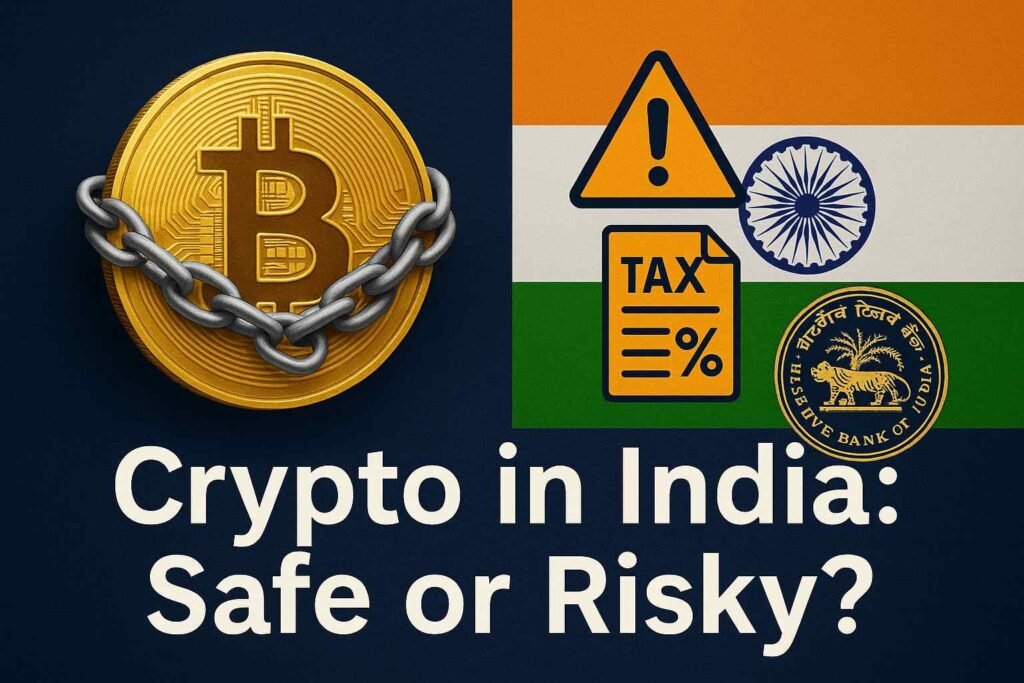Crypto is exciting. It’s fast-moving, global, and sometimes feels like the future. In India, more and more people are curious about investing in digital coins like Bitcoin, Ethereum, and Solana. But behind the hype, there are important things you need to know.
Let’s break it down — simple and clear.
Is Crypto Legal in India?
Crypto isn’t illegal. You can buy it, hold it, sell it. But don’t expect to use it to pay for your groceries. The Indian government doesn’t treat crypto as money. Instead, it’s called a Virtual Digital Asset (VDA).
So yes, you can invest in it. Just know that it comes with a lot of rules.
Different government bodies are involved:
- RBI keeps an eye on how crypto might affect our financial system.
- SEBI steps in if tokens look like securities.
- CBDT cares about how you’re taxed.
- FIU-IND tracks who’s investing and where the money is going.
So, crypto isn’t a free-for-all. There are eyes on it.
The Tax You Can’t Escape
This is where it gets real.
If you make profit from crypto, you pay 30% tax on it. That’s flat — no deductions, no tricks.
Also, 1% TDS is cut on every trade above ₹10,000. Even if you lose money, you still pay TDS. And forget about using crypto losses to balance other gains — that’s not allowed either.
Here’s a quick look:
| Tax Rule | What It Means |
|---|---|
| Profit on Crypto | 30% Tax |
| Trading Above ₹10K | 1% TDS |
| Losses | Can’t adjust them |
| Filing | You must report in ITR-2 or ITR-3 |
| Exchanges | Pay 18% GST on fees |
If you’re trading, keep records. Every rupee counts when tax season comes.
The Risk Part (Don’t Skip This)
Crypto is not for the faint-hearted.
Prices jump around like crazy. What’s worth ₹1 lakh today could be ₹60,000 tomorrow. That’s just how it is.
And hacks? They happen. In 2024, WazirX got hit. Hackers stole around ₹2,000 crore worth of crypto. That’s not small change.
Also, scams are everywhere. Telegram groups, Twitter tips, “next big coin” messages — most of them are traps. Once your money’s gone, it’s gone.
And let’s not forget: rules can change overnight. Governments all over the world are still figuring this stuff out.
How to Stay Smart (and Safe)
Here’s what helps:
- Use trusted Indian exchanges like WazirX, CoinDCX, CoinSwitch. They’ve registered with FIU-IND.
- Turn on 2FA. Always.
- Don’t keep everything online. Get a hardware wallet if you’re in it long-term.
- Keep a log of your trades. You’ll thank yourself later during tax season.
- Never fall for “guaranteed” returns. That’s usually a scam waiting to happen.
- Set aside money for taxes right when you book profits. Don’t spend it all.
This space moves fast. So, read the news. Watch updates from RBI or Income Tax Department. Stay in the loop.
Government’s Watching, Hard
In places like Jammu & Kashmir, the government has told exchanges to keep close track of user activity. Why? There’s concern about money being used for shady things, even terror funding. This is serious stuff.
At the same time, RBI is building its own Digital Rupee. This is a legal digital currency — no guesswork, no scams, backed by the Indian government.
So while private crypto might be the Wild West, the Digital Rupee will be more like a clean, government-controlled expressway.
Real Talk Before You Invest
Crypto is allowed, yes. But don’t treat it like a sure-shot money-making machine. That’s how people lose lakhs.
If you’re planning to invest, go slow. Understand the risks. Start small. Don’t throw in your emergency savings.
And for the love of money, pay your taxes. It’s not optional.
You don’t need to be a tech genius to start with crypto. But you do need common sense. Ask questions. Do research. Talk to others who’ve been in it longer.
Want more no-nonsense finance tips like this? Head over to moneyphobia.in. We keep it real.

For Advertising, Guest Posting, Newsletter Inserts please contact [email protected]. For general enquiries contact [email protected].
Recent Posts
Angel One Stock Broker Review
Income Tax Alert: ITR Filing Last Date for FY 2024-25 (AY 2025-26)
TikTok in India: The Buzz, the Ban, and What’s Really Happening
Wordle Answer Today (August 20, 2025): Hints and Full Solution Explained
Google Expands Store in India and Faces Global Play Store Challenges
Ola Electric Shares Recover Strongly After Heavy Fall in 2025
Gold Price Today: Rates Fall as Strong Dollar Impacts Market
Shreeji Shipping Global IPO Sees Strong Demand, GMP Suggests Listing Gains
India Approves ₹62,000 Crore Deal for LCA Tejas Mark 1A, HAL Shares Gain
Mangal Electrical and Gem Aromatics IPOs Draw Investor Attention with Steady GMP
Regaal Resources Makes Strong Market Debut with 39% Premium on Listing Day
Buchi Babu Tournament 2025 Begins with Exciting Performances